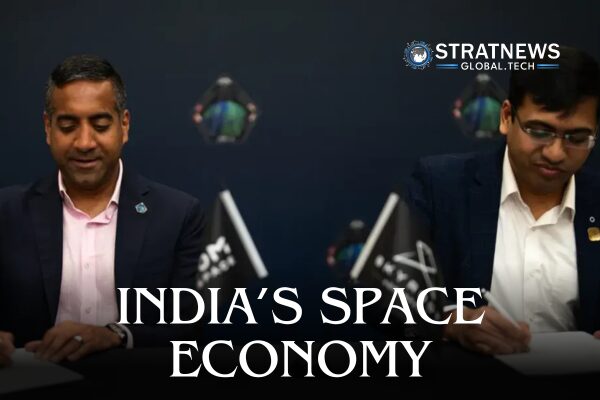India’s participation in the historic Axiom Mission-4 (Ax-4), which launched Group Captain Shubhanshu Shukla to the International Space Station, is more than a national milestone — it’s a signal of a strategic path forward for India’s space ambitions.
Calling the mission a “blueprint” for India’s journey toward building a $44 billion space economy by 2033, Pawan Kumar Chandana, Co-founder and CEO of Skyroot Aerospace, stated that the Ax-4 launch is emblematic of a new era in space exploration driven by global collaboration and public-private synergy.
“Axiom Mission-4, which carried Group Captain Shubhanshu Shukla to the International Space Station, is a shining example of the new era of space exploration—where national space agencies and private players come together to push the boundaries of what’s possible,” said Chandana in an exclusive conversation with StratNewsGlobal.
The mission, initiated through an ISRO-NASA partnership, executed by US startup Axiom Space, and launched aboard a SpaceX rocket, underscores a model India can adopt and adapt — especially as its private space sector begins to mature.
“While India’s private space ecosystem is in its early days, this proven model of public-private partnership can be strategically adopted for near-Earth missions, including satellite constellation deployments and beyond,” Chandana noted.
He believes such collaborative approaches will not only boost India’s share in the global space economy — currently around 2% — but will also give Indian private space-tech firms the operational experience and confidence to pursue more ambitious missions, including deep space exploration.
“It’s a blueprint for India to realize its ambitious goal of building a $44 billion space economy by 2033,” he added.
Skyroot-Axiom Partnership: Expanding the Model
Skyroot is already aligning with this model. The company recently signed a Memorandum of Understanding (MoU) with Axiom Space to explore opportunities for joint missions to low-Earth orbit (LEO), including launching cutting-edge research payloads, orbital data center nodes, and future support for the under-construction Axiom Station.
“At Skyroot, as we gear up for the maiden orbital launch of Vikram-1, we’re taking our own small but significant step in Indo-US space collaboration through our partnership with Axiom Space,” he said.
“The partnership will explore opportunities for Axiom Space to utilize Skyroot’s capabilities for sending groundbreaking research payloads, orbital data center nodes, and other future missions to its under-construction Axiom Station as well as independently to LEO.”
This is not just a commercial partnership, but a step toward redefining how India engages in international space programs.
According to him, “Enabling greater and equitable access to space, be it for research institutes, startups, or national agencies, is the guiding mantra at Skyroot.”
“As we begin realizing this vision with the upcoming maiden launch of Vikram-1, the partnership with Axiom Space builds an opportunity to explore integrated launch and orbital solutions that will shape humanity’s future in space.”
Toward a Global Space Ecosystem
Tejpaul Bhatia, CEO of Axiom Space, echoed Chandana’s enthusiasm, saying, “Since the day I visited Skyroot’s facility two years ago, I knew our companies had to work together to define humanity’s future in space.”
As Axiom Space continues developing a global supply chain for its commercial space station, India — and partners like Skyroot — are emerging as essential collaborators in that vision.
By anchoring itself in this new global paradigm of space partnerships, India has a clear route to move from a supporting role to a leading force in shaping the space economy of the next decade.


